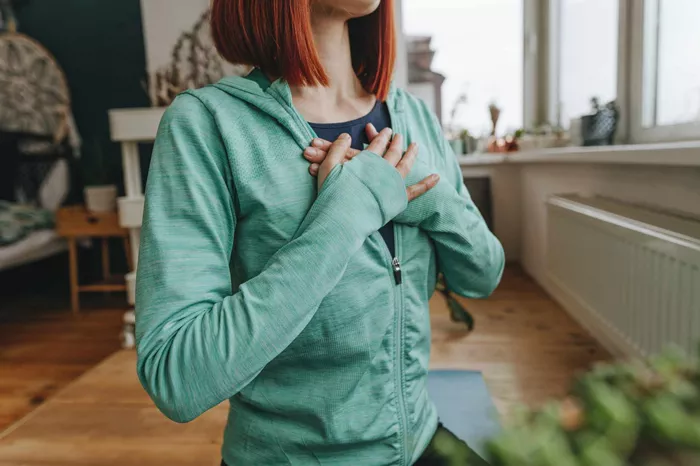Anxiety is a common condition that affects millions of people around the world. One of the most distressing aspects of anxiety is how it impacts breathing. Whether it’s shallow breathing, rapid breaths, or the sensation of not getting enough air, anxiety-related breathing problems can be overwhelming. In this article, we will discuss 5 common anxiety breathing symptoms and provide practical solutions to help manage them. With the right tools, it’s possible to regain control over your breathing and reduce anxiety’s physical effects.
5 Anxiety Breathing Symptoms & How To Stop Them
1. Shortness of Breath
Shortness of breath is a common symptom of anxiety. When you’re anxious, your body goes into “fight or flight” mode, triggering rapid and shallow breathing. This can lead to a feeling of breathlessness, as if you can’t get enough air. While this sensation can be frightening, it is usually harmless and temporary.
How to Stop It:
Practice Deep Breathing: Slow, deep breaths can help activate the body’s relaxation response and slow down the heart rate, easing the feeling of breathlessness.
Focus on Exhaling: Concentrate on your exhales. Exhaling for a longer duration than inhaling helps calm the body.
2. Rapid Breathing
When anxiety strikes, your breathing can become faster and more shallow. This rapid breathing, also known as hyperventilation, often occurs during a panic attack. It can lead to dizziness, tingling in the limbs, or a racing heart, making the anxiety feel even worse.
How to Stop It:
Slow Down Your Breathing: Inhale slowly through your nose for four counts, hold your breath for a moment, then exhale slowly through your mouth for six counts. Repeat this until your breathing becomes steady.
Use a Breathing Technique: Try the “4-7-8” technique. Inhale for 4 seconds, hold your breath for 7 seconds, and exhale for 8 seconds.
3. Tightness in the Chest
Anxiety can cause a feeling of tightness or pressure in the chest, which can make breathing feel difficult. This symptom can be particularly alarming because it mimics the sensation of a heart attack.
How to Stop It:
Try Relaxation Exercises: Progressive muscle relaxation helps reduce tension in the chest and other areas of the body.
Focus on Your Posture: Sit or stand up straight to open up the chest and promote easier breathing.
4. Feeling Like You Can’t Get Enough Air
Some individuals with anxiety experience the sensation that they aren’t getting enough air. This can cause feelings of panic or distress, especially in crowded or stressful situations.
How to Stop It:
Breath Counting: Inhale deeply through your nose, counting to four, then exhale slowly for a count of six. Focusing on counting can help shift your mind away from anxious thoughts.
Breathe into a Paper Bag: This helps restore normal carbon dioxide levels in the blood and can reduce feelings of air hunger.
5. Shallow Breathing
Shallow breathing is a result of anxiety that prevents deep, full breaths. Shallow breathing can make you feel lightheaded or dizzy, exacerbating feelings of panic.
How to Stop It:
Diaphragmatic Breathing: Breathe deeply into your diaphragm rather than your chest. Place your hand on your abdomen, and as you breathe in, focus on expanding your belly. This encourages full breaths.
Mindful Breathing: Pay attention to your breathing throughout the day. Gently remind yourself to breathe deeply and slowly when you notice shallow breaths.
Conclusion
Breathing problems related to anxiety can be distressing, but they are manageable. By understanding the symptoms and practicing effective breathing techniques, you can regain control over your body and reduce the effects of anxiety. Remember, it’s essential to remain patient with yourself and practice these techniques regularly to improve your mental and physical well-being.
7 FAQs About Anxiety Breathing Symptoms
1. Why does anxiety affect my breathing?
Anxiety activates the body’s “fight or flight” response, causing rapid, shallow breathing as part of the stress response.
2. Is it normal to feel like I can’t get enough air during anxiety?
Yes, it’s a common symptom of anxiety. It can feel frightening, but it’s usually not harmful.
3. How can I tell if my shortness of breath is due to anxiety or something else?
If the shortness of breath occurs in stressful situations and goes away once you calm down, it’s likely related to anxiety. However, always consult a doctor to rule out other causes.
4. Can deep breathing help with anxiety attacks?
Yes, deep breathing helps activate the body’s relaxation response and can reduce the symptoms of anxiety attacks.
5. How often should I practice breathing exercises?
It’s best to practice breathing exercises daily, even when you’re not feeling anxious. This helps your body respond more effectively when anxiety arises.
6. What’s the best way to prevent hyperventilation during an anxiety attack?
Pursed lip breathing or breathing into a paper bag can help prevent hyperventilation by restoring normal breathing patterns.
7. Can anxiety-related breathing problems go away on their own?
With time, practice, and proper management, anxiety-related breathing problems can lessen or disappear. However, ongoing anxiety should be addressed with a healthcare provider.
Related topics:
- 12 Ways To Help Someone Stop Overthinking Over Text
- How To Help Teens With Anxiety?
- Masochism: A Behavioral Quirk Or Mental Illness?


